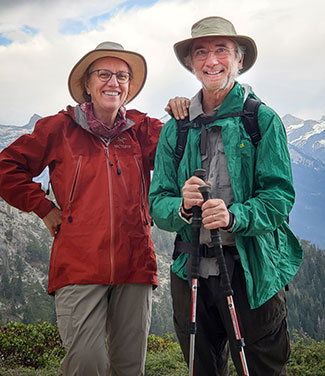
Change is everywhere at UC Merced this year, from hiring a new chancellor to the completion of a major campus expansion. The Sierra Nevada Research Institute (SNRI), an early hallmark of research excellence at UC Merced, is also making a change: After a 13-year tenure, Faculty Director Professor Roger Bales has stepped down and Professor Tom Harmon is taking the reins.
Both Harmon and Bales are founding faculty members who joined UC Merced in 2003, just as the campus was being built. They both research a variety of topics related to hydrology, climate change and sustainability. Harmon has spent much of his time working in and around soils, groundwater wells and rivers, while Bales focuses on the Sierra Nevada headwaters, forest management and water resources.
Former Vice Chancellor for Research and Economic Development Sam Traina, founding director of SNRI, said Bales took what was UC Merced’s inaugural research center to the next level as the campus’s first organized research unit.
“The institute developed a national and international reputation for research excellence in upland hydrology, forest health, ecosystem science, resource management and other areas,” Traina wrote in a campus announcement.
SNRI built research infrastructure to help fulfill its mission of using the Sierra Nevada-Central Valley region as a natural laboratory for research. It also nurtured the campus’s engagement with the National Park System, established UC Merced’s participation in the UC Natural Reserve System and launched the Environmental Analytical Laboratory.
“SNRI helped us establish ourselves as a major research university,” Bales said. “It became what we were known for in the early years.”
Because of the research conducted through SNRI, much more is known about such concerns as tree mortality in mega-droughts, wildfire and aggressive fire-fuels treatment, and the vulnerability and resiliency of the Sierra Nevada’s headwaters as California’s water supply.
“Our research and the solutions we’ve offered are being used to ensure the ecological soundness of the Sierra Nevada forest,” he said.
SNRI has made important contributions to research, sustainability and natural resources management in California and beyond, and now Harmon is ready to lead the institute into its next chapter.
“Roger’s tenure has been nothing short of remarkable,” Harmon said. “I’m eager to maintain the momentum and help SNRI’s reach and impact grow in the region, the state and the world.”

“California aims to lead in transitioning away from fossil fuels and to renewable energy, and the UC has major role to play. I look forward to being able to contribute to that work. After all, if California can’t save the world, who can?”
Harmon said he’s excited to work with SNRI’s more than 40 faculty affiliates, who come from all three schools:Engineering, Natural Sciences, and Social Sciences Humanities and Arts (SSHA). They take interdisciplinary approaches to understanding a wide range of issues including forest restoration, soil biology, tree genomics, wildfire and watershed management. Harmon said he would like to see even more research affiliates from SSHA, because he feels that will lead to more impactful research outcomes.
“We’ve got exceptionally good faculty, both early in their careers and well-established,” Harmon said. “I hope, through them, the university can broaden its reach within the region.”
Harmon said the campus’s home in the San Joaquin Valley means the university is in the perfect place to take on complex socio-environmental issues and identify solutions to many of the area’s challenges that mirror similar sustainability and equity problems around the world.
Because SNRI has fostered collaborative research across the UC and with federal and state agencies and non-governmental organizations, it already has strong relationships with those agencies and groups and is recognized as an important partner in and contributor to regional sustainability.
As director, Harmon works with SNRI staff and a faculty advisory group to determine the direction of research and conduct strategic project planning for the SNRI faculty. He is currently working to build teams and research capacity in two areas: smart, sustainable agriculture that will build better lives for farm workers, and energy resiliency in the rural communities around the Valley.
“Although increasing food quantity and quality is important, the next revolution in agriculture needs to consider more,” Harmon said. “Working conditions, job security, and environmental sustainability have to be woven into the farm fabric. It’s going to be challenging and take genuine collaborations between our faculty and the agricultural stakeholder community to do this work. But I think we have the right people to create this more holistic approach.”
Since accepting the job, he’s begun getting to know not just the newer faculty members, but people from parks, water, utility and human services agencies in the area, and wants to set up listening/learning sessions for researchers to get the information they need to consider issues from all angles.
“I really enjoy putting together the right teams to study and help solve socio-environmental problems,” he said. “I want to dedicate a major part of my effort toward helping our faculty engage with different community groups and agencies so we can help address their challenges in socially and culturally acceptable ways. Otherwise, the solutions won’t work.”
While more administrative work likely means some of Harmon’s other faculty duties are lightened, Bales returns to his role as a distinguished professor in the School of Engineering.
He said he will increase his teaching load, focus on his research and work on sustainability leadership in several projects across the UC system, including the Global Climate Leadership Council.
“California aims to lead in transitioning away from fossil fuels and to renewable energy, and the UC has major role to play. I look forward to being able to contribute to that work,” Bales said. “After all, if California can’t save the world, who can?”
Lorena Anderson

Senior Writer and Public Information Representative
Office: (209) 228-4406
Mobile: (209) 201-6255






